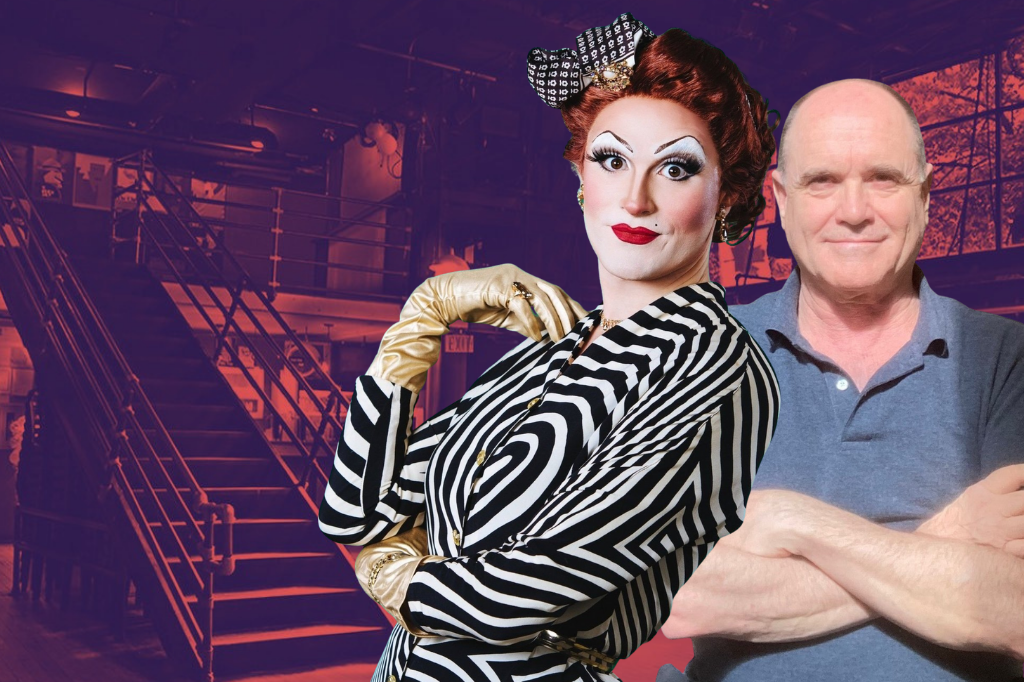“Pearle Is My Superpower”: In Conversation with Justin Miller (AKA Pearle Harbour) and John Turner
Pearle Harbour is coming to Buddies in Bad Times.
That’s not as dire as it might sound. Justin Miller, a theatre maker, playwright, and producer, created Pearle as a testament to hope and the dangers of nostalgia. Pearle is the ultimate pin-up girl, sweet yet sultry, a relic of when things were still Great — if ever they were.
Miller is bringing Pearle back to her fans on the home front with Distant Early Warning, opening at Buddies in Bad Times on May 19. Pearle’s not alone — she’s being directed by legendary clown creator John Turner, best known for his clown duo Mump and Smoot.
Turner and Miller go way back. Miller trained with Turner at his Clown Farm, and the two have maintained a colleagueship — or “more like a surrogate son”-ship, according to Turner — ever since.
“This is the first time I’ve been honoured with the task of directing Distant Early Warning,” said Turner in our early-morning Zoom interview.
“There’s also definitely a strong relationship between drag and clown. There’s not a whole lot of space between them. Plus, performer-created work is a very specific directorial task. My task in this work is assisting Justin in achieving his vision — for us to find the overlap in our visions of the work. That’s our playground.”
The playground here, Distant Early Warning, has been a total creative joy for Miller.
“It grew out of another piece I developed for Buddies called Battle Cry. That was created in 2018 and 2019, when things seemed to be as bad and as fractious as they would ever be. I didn’t think that it could ever get worse than it was, politically,” he said with a hollow laugh.
“I was invited into the Buddies residency program, and they challenged me to think a little deeper about the context of the show. In the process of that development, the show was written, and re-written, and burned to the ground, and re-written. Distant Early Warning arose when I became more interested in Cold War anxiety, Cold War paranoia.”
The play is a tense, high-stakes look at Pearle’s final three days on Earth, in which she repeatedly tells audiences, ‘he’s coming to save me,’ ‘he’s coming to give me everything I was promised in my past life.’” Pearle has pinned all hope for the future on a mysterious boyfriend we can’t see — all we can do is take her word for it that things will get better any day now.
But what is a distant early warning, exactly?
“It was an American and Canadian bilateral defense system erected in the late 1950s as a deterrent against Russian nuclear annihilation,” said Miller confidently.
“And there was a lot wrong with it. Simple flocks of birds were enough to fuck it up. It was obsolete within a couple years of being built. The system’s function wasn’t what was marketed to the public — a defense tool. Its primary purpose was not to intercept or stop any nuclear bomb, but to detect and therefore unload our own nuclear arsenal.”
“It was more a mutually assured destruction machine than it was any defense.”
Pearle slots into that narrative easily. She’s a figure of “toxic nostalgia,” as Miller puts it, an icon who understands these “dusty little bits of history.”
“‘Distant early warning’ is such a compelling set of words together. It’s confusing, and beguiling — a ‘warning’ is something immediately apparent to us. It’s seductive. What happens when we’re pulled off course by what we perceive as a threat?”
The promotional material for the show describes Distant Early Warning as a “post-annihilation love story” — equal parts romantic and desolate, perhaps even an oxymoron.
“It’s definitely a love story,” said Turner. “A self-love story. There’s no question about that. It’s not worth putting anything on stage if it isn’t somehow a love story.”
“It’s all love. Being human boils down to love and fear, life and death. That’s all it is.”
Miller agreed: life is a series of binaries, and often a frightening one.
“Audiences have seen depictions of the end of times since the beginning of time,” said Miller. “There’s no need to focus on that, on the boom, on the cannibals, on the mutation. I wanted to reckon with consequence — to give Pearle, who can be selfish and nasty and cruel and inglorious, some consequence.”
“Audiences focus on the loveable parts of Pearle. But there are deep and dark parts, too. I wanted to make her go through it, and set Distant Early Warning in the apocalypse, in what is essentially a mound of rubble.”
“What could possibly make that experience bearable for her? Simple: love and sex. The same things which have made life bearable this whole time.”
Miller’s journey with Pearle has been a transcendent one.
“There’s something about putting on drag, about making yourself spectacularly other, which gives you permission to get close to audiences physically, emotionally, spiritually. There’s something very ancient about sharing those stories and gesturing towards these truths. It seems so logical to me to pair clown and drag together. It makes sense to me,” he said.
“Pearle is my superpower.”
Distant Early Warning runs at Buddies in Bad Times through May 29. Tickets are available here.















Comments